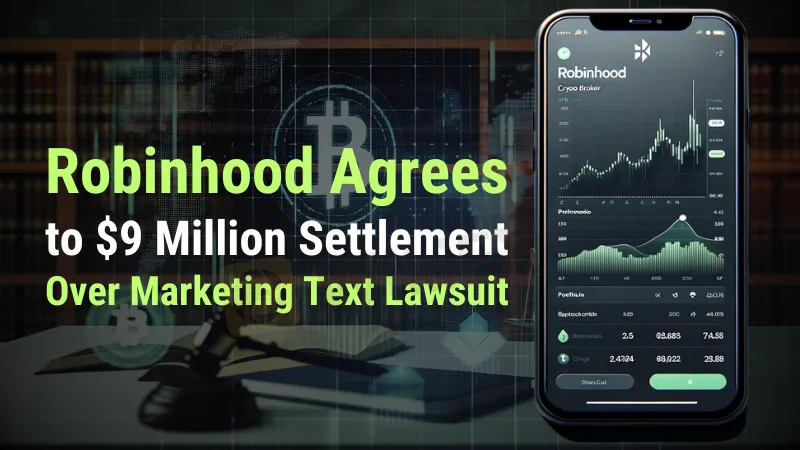简体中文
繁體中文
English
Pусский
日本語
ภาษาไทย
Tiếng Việt
Bahasa Indonesia
Español
हिन्दी
Filippiiniläinen
Français
Deutsch
Português
Türkçe
한국어
العربية
Robinhood Agrees to $9 Million Settlement Over Marketing Text Lawsuit
Abstract:Robinhood settles a lawsuit for $9M over unsolicited marketing texts, marking a significant shift in digital marketing and consumer privacy laws.

In a historic ruling, Robinhood, a well-known financial services provider, agreed to pay $9 million to resolve a lawsuit over its “refer-a-friend” marketing text messages. This settlement, entered yesterday in Washington Western District Court, marks a watershed moment for the firm in resolving legal objections to its marketing methods.
Cooper Moore and Andrew Gillette filed the complaint on behalf of a class of consumers who received unsolicited marketing messages from Robinhood. If the court approves the proposed settlement, it would establish a $9 million fund for anyone harmed by these ads. This fund seeks to satisfy claims arising from text messages received as part of Robinhood's referral scheme, which was at the heart of the litigation.
The path to this settlement has been lengthy and complicated, spanning over two years of intense litigation. Before reaching this agreement, the parties had made great progress in the legal process, including briefing on various motions and approaching completion of class certification discovery. The plaintiffs have now asked the court to preliminary approve the settlement, which includes identifying the Settlement Class, distributing notice, and scheduling a Final Approval Hearing.
The Settlement Class is defined as persons who, as Washington residents, received a text message about Robinhood's referral program between August 9, 2017, and the date of the settlement's preliminary approval. Individuals who willingly opt to receive such marketing materials are excluded from this category.

The Plaintiffs' Counsel estimates that over one million clients, primarily in Washington, are affected. The Settlement Fund covers Settlement Class payments and settlement management. It will also cover any court-approved sums for lawyers' fees, costs, and service awards for the Class Representatives. Each member of the Settlement Class who files a legitimate claim will be entitled to an equal part of the fund, pending the court's ultimate determination.
The complaint focuses on text messages sent by Robinhood consumers during the company's refer-a-friend promotion. Plaintiffs Moore and Gillette objected to the unsolicited nature of these communications, claiming that they did not agree to receive them. They claimed the company gave clients free stock and technological means to launch these messages using the Robinhood app. They claimed Robinhood gave them free stock and app technology to send notifications. Contacts, conversations, and user-specific recommendation links and content. Content, user-specific relationships.
If the court accepts the deal, it would be a key step toward resolving the legal difficulties involving Robinhood's text message marketing practices. This case demonstrates the vital need for gaining express agreement on digital marketing tactics, especially for text message interactions. The settlement indicates Robinhood's understanding of the legal norms that govern promotional efforts, as well as its commitment to upholding these standards.
Related news:
The final ruling, which is still awaiting court approval, will bring to an end significant litigation in the realms of digital marketing and privacy. It establishes a precedent for how businesses should handle permission in their marketing tactics, particularly in an age where digital communication is pervasive. This settlement also serves as a reminder to firms about the legal ramifications of unwanted marketing operations, emphasizing the need for transparency and respect for consumer privacy in all marketing initiatives.
To summarize, Robinhood's decision to settle the complaint for $9 million represents a breakthrough in the world of digital marketing legislation. It emphasizes the necessity of following legal guidelines and the need for businesses to be cautious about how they interact with customers via digital platforms. As the court prepares to review and perhaps approve this settlement, it serves as a reminder to the corporate sector of the critical role that ethical marketing practices play in preserving consumer trust and upholding legal standards.
Get the scoop on Robinhood's $9 million settlement and its impact on digital marketing laws at WikiFX Daily News. Quick insights, major developments!

Disclaimer:
The views in this article only represent the author's personal views, and do not constitute investment advice on this platform. This platform does not guarantee the accuracy, completeness and timeliness of the information in the article, and will not be liable for any loss caused by the use of or reliance on the information in the article.
Read more

Vantage Markets Review 2025: Trusted Forex and CFD Trading Since 2009
Explore our 2025 Vantage Markets review! A trusted Sydney-based broker since 2009, offering forex, CFDs, low spreads, global regulation, and 24/7 support. Trade from $50!

IronFX vs Exness Review 2025: Comprehensive Broker Comparison
Explore an in-depth comparison between IronFX and Exness. Compare licensing, features, regulation, trading platforms, and customer service for smarter trading decisions.

eToro Review 2025: Top Trading Opportunities or Hidden Risks?
Is eToro a trustworthy broker or a scam in 2025? Explore its regulations, user reviews, and reputation to decide if it’s safe for trading forex, stocks, and crypto. Read now!

ASIC Urges Financial Licensees to Fix Register Errors Before 2026 Deadline
ASIC has warned AFS licensees to urgently correct errors on the Financial Advisers Register, with over 4,600 advisers still not meeting the 2026 qualification standard.
WikiFX Broker
Latest News
ASIC Urges Financial Licensees to Fix Register Errors Before 2026 Deadline
eToro Review 2025: Top Trading Opportunities or Hidden Risks?
How much money will you earn by investing in Vantage Broker?
IronFX vs Exness Review 2025: Comprehensive Broker Comparison
Fraudsters Are Targeting Interactive Brokers' Users with Lookalike Emails
Top Tips to Choose the Best Forex Broker in 2025
SEBI Notifies New F&O Rules for Investors - New Derivative Trading Limits & More Amendments
Interactive Brokers: Global Office Visits and Licensing Details
U.S. Jobs Data Released: A Potential Boost for Gold Prices
Everything you need to know about ADSS
Currency Calculator



